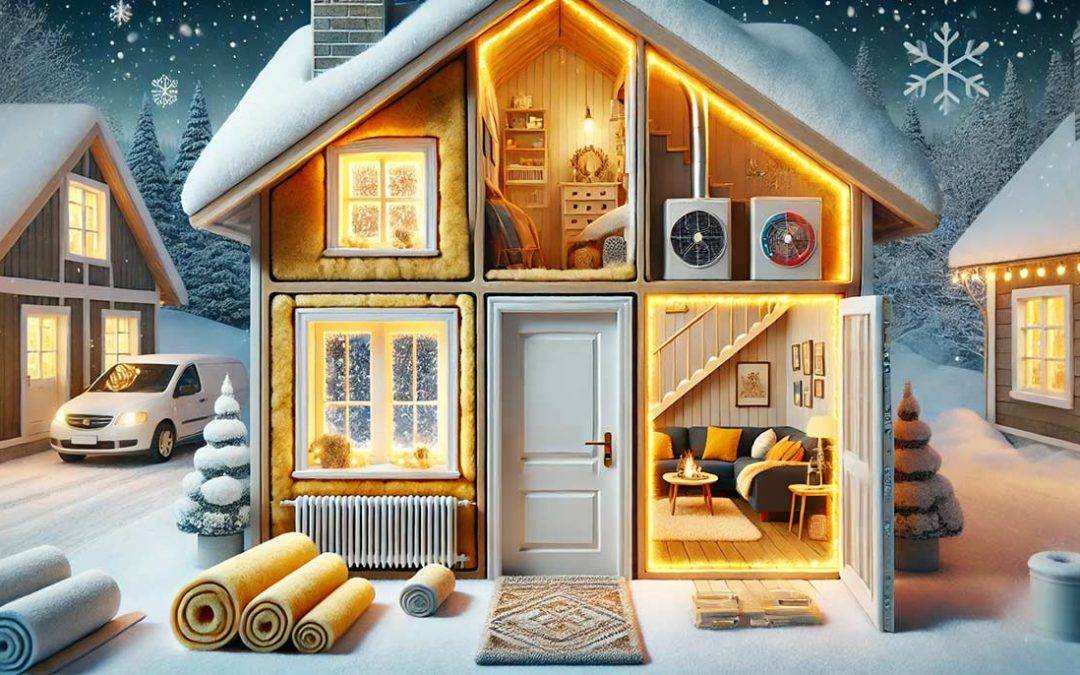As winter approaches, many homeowners in Virginia are preparing for colder temperatures and the increased energy costs that come with them. Winterizing your home, especially your HVAC system, is one of the best ways to keep energy bills in check while maintaining a cozy indoor environment. With a few strategic upgrades and maintenance steps, you can ensure your heating system runs efficiently all season. Here’s how to winterize your home and keep your HVAC system in top shape for the cold months.
1. Seal Leaks Around Windows and Doors
One of the biggest culprits for heat loss in any home is drafts around windows and doors. Even small leaks can let warm air escape, causing your HVAC system to work overtime to maintain the desired temperature. In Virginia, where temperatures can vary significantly, sealing these leaks is essential.
- Use Weatherstripping and Caulk: Applying weatherstripping around doors and caulking around windows is a simple and cost-effective way to reduce drafts.
- Add Door Sweeps: Install door sweeps at the base of doors to block cold air from sneaking in.
- Consider Window Film: If your windows are older, adding an insulating window film can help trap warm air indoors.
2. Upgrade Your Thermostat
An outdated thermostat can lead to unnecessary heating expenses. Smart thermostats, which allow you to control temperatures remotely, are becoming increasingly popular due to their energy-saving benefits. These devices make it easy to set schedules, ensuring your home stays warm only when you need it.
Why a Smart Thermostat Makes Sense in Virginia:
- Flexible Scheduling for Variable Temperatures: Virginia weather can fluctuate, especially in the fall and early winter. With a smart thermostat, you can adjust your settings based on real-time weather changes.
- Save on Energy Costs: Setting your thermostat a few degrees lower while you’re away or sleeping can lead to significant savings. Smart thermostats make these adjustments easy and automatic.
Learn more about our smart thermostats here.
3. Replace HVAC Filters Regularly
A clean filter is vital to efficient HVAC operation. Dirty filters restrict airflow, making your system work harder to heat your home. In Virginia’s fall and winter, allergens and dust levels can rise, so replacing filters regularly helps improve indoor air quality and keeps your system running efficiently.
- Change Filters Every 1-3 Months: During the winter, it’s best to change filters more frequently to keep up with increased use.
- Use High-Quality Filters: For improved indoor air quality, consider HEPA filters or those with a higher MERV rating.
- Set a Reminder: It’s easy to forget to change filters, so set a calendar reminder to stay on schedule.
4. Insulate Your Ductwork
If your home has older ductwork, it may lack sufficient insulation. Poorly insulated ducts allow heated air to lose warmth as it travels through unheated areas like basements, crawl spaces, or attics. In Virginia’s colder months, this can lead to heat loss and increased energy costs.
5. Get an Annual HVAC Tune-Up
An annual HVAC inspection and tune-up ensure your system is prepared for the demands of winter. A professional tune-up can help identify minor issues before they become costly repairs, prolong the life of your system, and keep it running at peak efficiency. Learn more about our Preventative Maintenance Plan here.
6. Add Attic Insulation
Heat rises, and if your attic isn’t adequately insulated, it can escape through your roof. Adding insulation to your attic is a cost-effective way to keep warm air in your living spaces. This is particularly important in Virginia, where winter temperatures can dip low and lead to heat loss if your home isn’t properly insulated.
7. Reverse Your Ceiling Fans
It may seem counterintuitive to use ceiling fans in winter, but reversing the direction of your ceiling fans can help keep warm air from rising. By setting your fans to spin clockwise at a low speed, you can push warm air back down into the room, helping to maintain a comfortable temperature without overworking your HVAC system.
Final Thoughts
Winterizing your home not only keeps you warm but also saves money on heating bills and extends the life of your HVAC system. With a few easy steps like sealing leaks, upgrading your thermostat, and adding insulation, you can enjoy a comfortable home while reducing energy costs. Taking these steps now, before winter fully sets in, will keep your home cozy and efficient throughout the cold months ahead. If you need help with HVAC maintenance or insulation advice, contact a local Virginia HVAC professional to ensure you’re fully prepared for the season.


Recent Comments